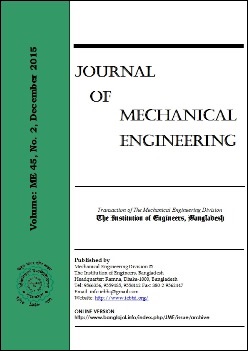The Effect of Copper and Brass on Friction Stir Welded Dissimilar Aluminium Alloy When Used as in Thin Sheet Form
DOI:
https://doi.org/10.3329/jme.v45i2.28210Abstract
In recent years aluminium and aluminium alloys are most widely used in many applications because of light weight, good formability and malleability, corrosion resistance, moderate strength and low cost. Friction Stir Welding (FSW) process is efficient and cost effective method for welding aluminium and aluminium alloys. FSW is a solid state welding process that means the material is not melted during the process. Complete welding process accomplishes below the melting point of materials so it overcomes many welding defects that usually happens with conventional fusion welding technique which were initially used for low melting materials. Though this process is initially developed for low melting materials but now process is widely used for a variety of other materials including titanium, steel and also for composites. The present butt jointed FSW experimental work has been done in two ways. Initially a comparison of tensile properties of friction stir (FS) welded similar aluminium alloy (AA6351 with AA6351) and dissimilar aluminium alloy (AA6351 with AA5083) combinations. Later the effect of impurities (copper and brass) in sheet form (0.1 mm thick) when used as insert in between two dissimilar aluminium alloy (AA6351 with AA5083) plates during FSW. Tensile tests were performed for these combinations and results were compared for with and without using strip material (copper and brass).
Downloads
198
247

